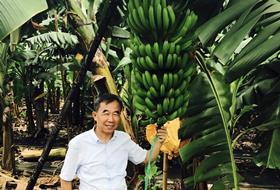
Du Roi Laboratory, South Africa’s leading banana tissue culture facility, has acquired the rights for the field evaluation and eventual commercialisation of the Formosana variety, a Panama disease (FOC TR4) resistant variety.
This strain of Panama disease is devastating to banana growers across the world and severely impacts on their profitability and the success of the global banana industry.
Du Roi Lab has signed an agreement with the owners of the variety, the Taiwan Banana Research Institute (TBRI), to evaluate Formosana in certain banana producing countries in Africa and Central and South America.
The intention of TBRI and Du Roi Lab is to offer Formosana commercially following the successful conclusion of commercial trials.
Chih-Ping Chao, head of TBRI, was exited by the prospect of bringing the variety to South Africa.
“We are excited to partner with Du Roi Lab to provide a viable option to banana growers against this strain of Panama disease,” Chao said.
“We find Du Roi as a reliable and efficient partner in the provision of tissue culture of Formosana for wider commercial adaption trials and eventual use towards managing and or containing FOC TR4 epidemics.”
According to Agustin Molina, international technical consultant of the TBRI, Formosana have great potential in coping and managing Fusarium based on successful commercial experiences in the Philippines and Mozambique.
Suné Wiltshire, general manager of Du Roi Lab, said gaining access to this variety marks a significant step forward in the fight against TR4.
“It is a really significant breakthrough for the global banana industry as the Formosana variety is commercially proven to be resistant to Tropical Race 4 (FOC TR4) Panama disease caused by the soil-inhabiting fungus,” explained Wiltshire.
“We are very excited to be able to partner with TBRI and offer this variety to our clients and the international banana industry. It serves to reaffirm our commitment to innovation to the benefit of the industry.”
The Formosana variety bred by TBRI will arrive in phases at the Agricultural Research Centre VOP (Vegetable and Ornamental Plants) facility in Pretoria, South Africa where it will remain in quarantine until results are obtained for indexing of various viral, bacterial and fungal diseases.
It will then be transferred to Du Roi Lab’s facility where it will be provided to international partners for field adaption commercial trials.



